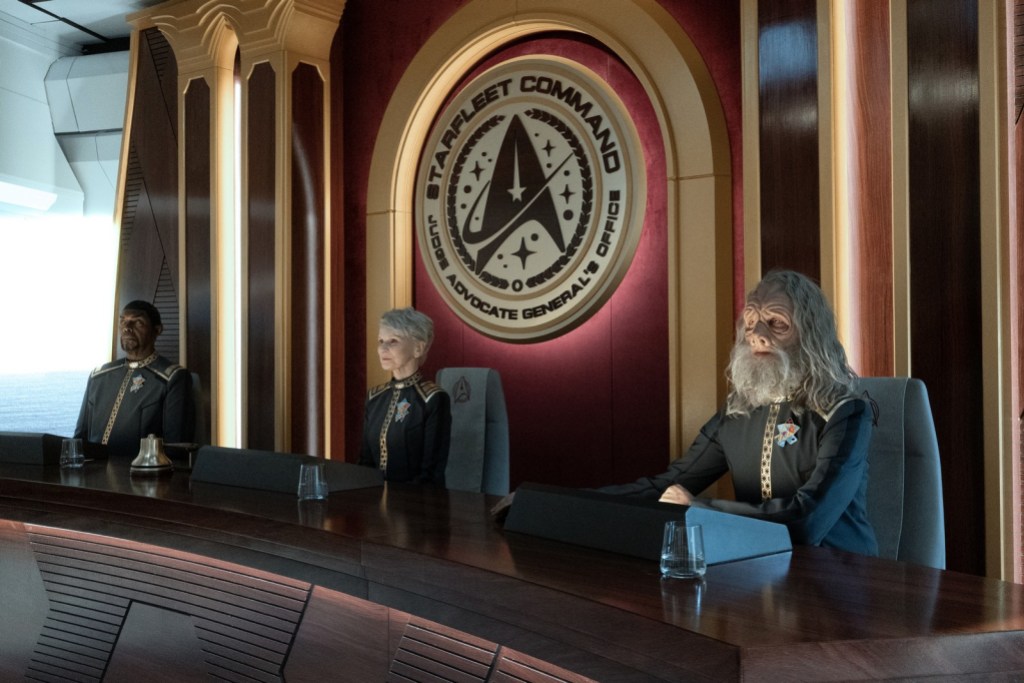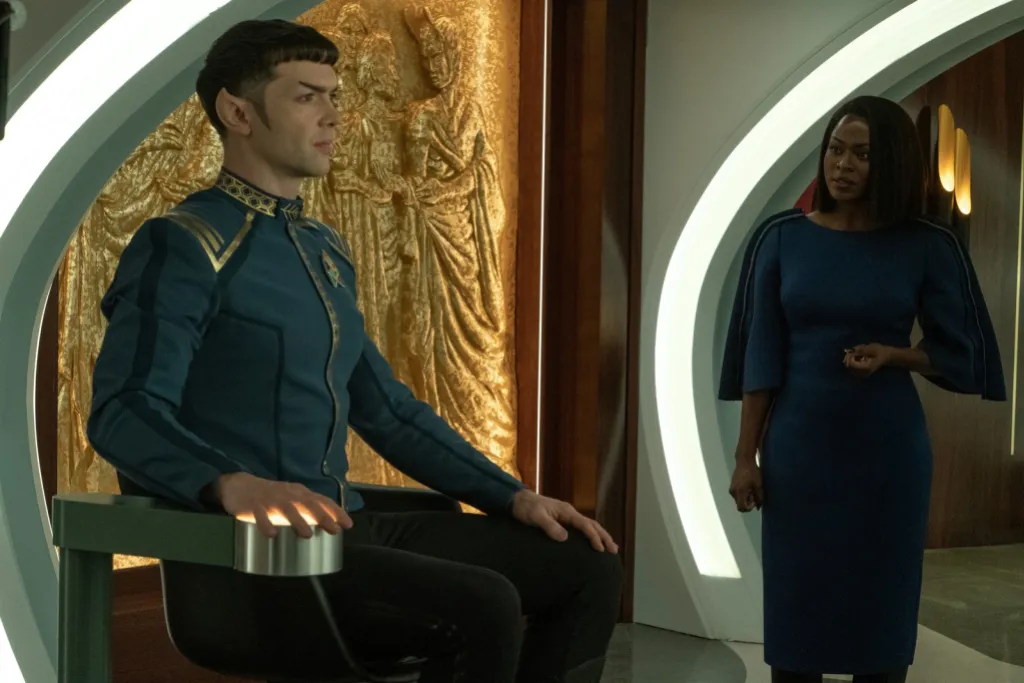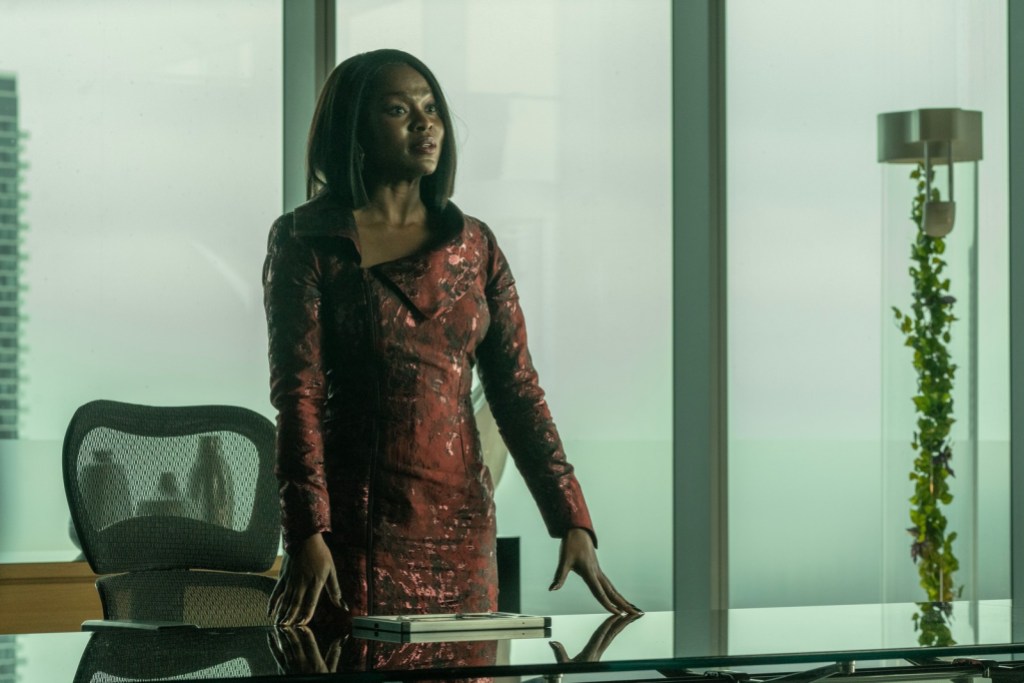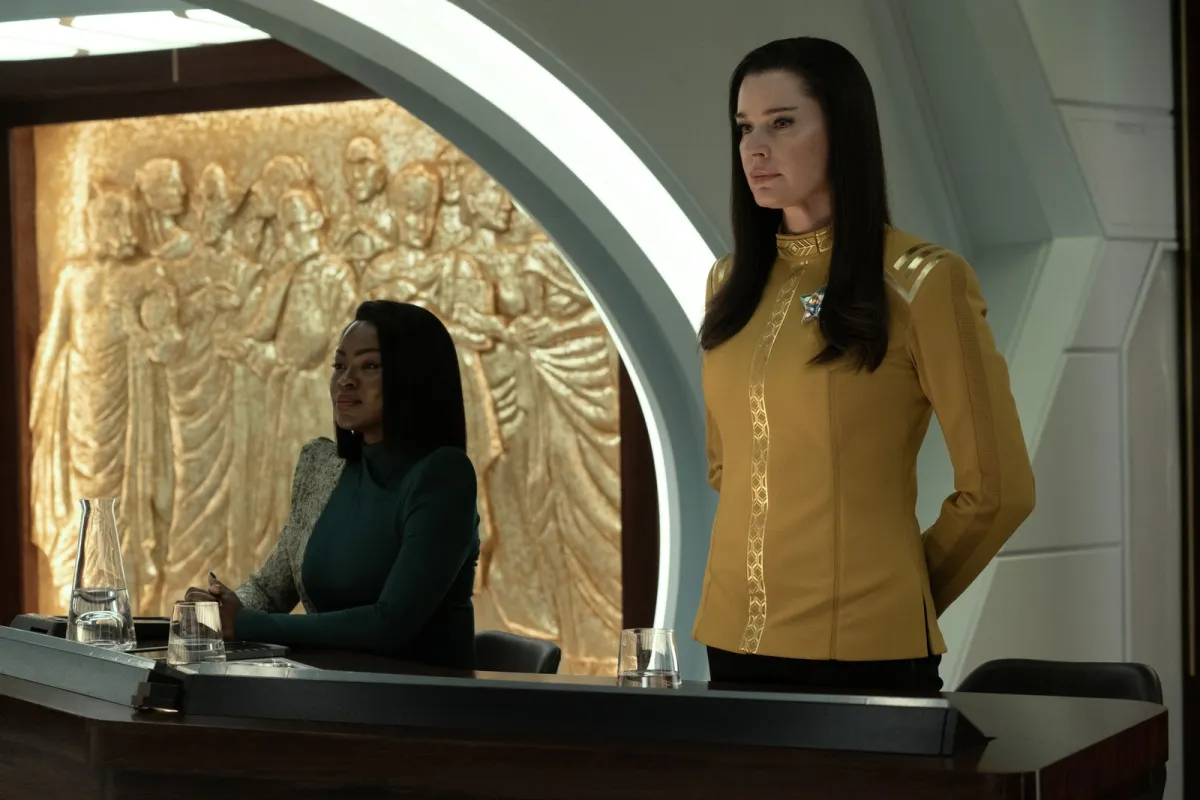This discussion and review contains spoilers for Star Trek: Strange New Worlds season 2, episode 2, “Ad Astra Per Aspera,” on Paramount+.
“Ad Astra Per Aspera” certainly has its flaws, but it is the best live-action episode of Star Trek in the past five years. A large part of that is because it finds a deeper purpose to the show’s nostalgia for the 1990s era of Star Trek overseen by Rick Berman. It justifies its decision to go back and revive the format, conventions, and structures in a world and industry that have moved on. “Ad Astra Per Aspera” is more than mere fan service. It is a reckoning with a longstanding failure in the franchise at a time when that truly matters.
“Ad Astra Per Aspera” is ostensibly about the trial of Commander Una Chin-Riley (Rebecca Romijn), who is accused of concealing her genetic engineering from Starfleet. However, in the grand tradition of Star Trek, this is just a metaphor. Chin-Riley’s secret life is treated as a metaphor for queer identity; the character is coded as gay or even trangender, with Starfleet’s prejudice towards her framed in terms that evoke homophobia or transphobia.
“When they didn’t know, they didn’t care,” Una explains of Starfleet’s attitude, evoking the infamous “don’t ask, don’t tell” policy. Characters state that Una was “outed,” language associated with the exposure of gay or transgender individuals. As Vice Admiral Pasalk (Graeme Somerville) converses with Lieutenant Spock (Ethan Peck), Lieutenant Erica Ortegas (Melissa Navia) summarizes his position, “I do hope you understand why I have to throw your friend in jail simply for being who she is.”
It’s worth acknowledging that Rick Berman’s Star Trek had a massive blind spot when it came to queer rights. After all, the Star Trek franchise likes to congratulate itself (sometimes a little too enthusiastically) for its stances on civil rights. However, as 1990s television shows like Friends, Ellen, and Will & Grace brought openly gay characters into mainstream pop culture in admittedly complicated ways, the Star Trek franchise largely turned a blind eye to that civil rights cause.

David Gerrold’s AIDS metaphor “Blood and Fire” was never filmed for Star Trek: The Next Generation. When producer David Livingston heard that Jonathan Frakes planned to include a single shot of a same-sex couple in “The Offspring,” he raced to the set to prevent it from happening. When Frakes argued for the casting of a male actor as his love interest in “The Outcast,” he was overruled. Asked to explain why there were no gay characters in the franchise, Ronald D. Moore stated the only possible answer was that “people in charge don’t want gay characters in Star Trek, period.”
To its credit, Star Trek: Deep Space Nine did better than its sibling shows, with episodes like “Rejoined” or “Chimera” not just portraying relations between actors of the same gender, but dealing with institutional homophobia. That said, the show still treated lesbians and bisexuals as camp eye candy in the mirror universe. Showrunner Ira Steven Behr has been candid in acknowledging “we could have done better. Trust me. We should have done better.”
Modern Star Trek has made meaningful advances in the area, with the inclusion of Paul Stamets (Anthony Rapp) and Hugh Culber (Wilson Cruz) and the introduction of characters like Adira Tal (Blu del Barrio) on Star Trek: Discovery. However, nostalgia for 1990s Star Trek can have frustrating results. The third season of Star Trek: Picard, essentially a nostalgic revival of The Next Generation, marginalized its preexisting queer characters and scrapped its central transgender metaphors.
However, modern Star Trek also — like a lot of modern fan service- and nostalgia-driven media — struggles to engage meaningfully with its relationship to a complicated history. Modern Star Trek shows tend to treat Rick Berman’s Star Trek shows as a lost and idealized past when everything was perfect. This is perhaps most obvious in the way that these shows fetishize Starfleet, an institution of which The Next Generation and Deep Space Nine were frequently and justifiably critical.

That’s why “we are Starfleet” has become something of a mantra for these shows, a way of treating Starfleet as a stand-in for the franchise and its values. However, treating Starfleet as a stand-in for the larger Star Trek franchise, particularly in the context of this 1990s nostalgia, means wrestling with that complicated history in a meaningful way. It is something that Deep Space Nine did regularly but that most of these modern Star Trek shows have been unable to do. “Ad Astra Per Aspera” is an episode the franchise should have made decades ago.
This is what makes “Ad Astra Per Aspera” so bracing. It’s an episode that puts the era of the show that Star Trek: Strange New Worlds is so nostalgic for on trial. It’s notable that the first witness is Captain Robert April (Adrian Holmes), not only the first canonical commander of the Enterprise but also one explicitly modeled on Gene Roddenberry. Una protests to her lawyer, Neera Ketoul (“Ketoul” spelling TBA, Yetide Badaki), “What was that? You’re supposed to defend me, not attack Admiral April, not indict the Federation.”
Neera is a fascinating character, one who generates considerable tension within the narrative. She is a character who is hostile to the Federation and to Starfleet. She is, of course, entirely justified. Her outrage is understandable. However, the episode toys with the idea that she is foil to both Una and to Captain Christopher Pike (Anson Mount), that she is an extremist who needs to moderate her position to win the case. The episode even sets up the red herring that she might have outed Una.
“All you ever wanted here was a soap box,” Una protests. “This isn’t about defending me. This is just a way for you to broadcast your hatred of the Federation. I thought you were here to help me, but you’re not. As long as you can make the Federation look bad, then who the hell cares if I get left behind in the process?” There is a worry “Ad Astra Per Aspera” will indulge in the facile “both-sides-ism” that undermines a lot of Strange New World’s best setups, dating back to the premiere.

While there is no doubt that Strange New Worlds is well intentioned, the show has a tendency to get in its own way. After all, the transgender metaphors in “The Serene Squall” were undercut by placing them in a story about a villain played by an openly trans and non-binary actor pretending to be someone they are not to gain access to a space they shouldn’t be in. Still, it’s small touches like Commander Pelia (Carol Kane) talking about “coming out” in “The Broken Circle” that feel sincere.
As such, it’s refreshing that “Ad Astra Per Aspera” doesn’t paint Neera as a villain. She leaves the ship to applause. More than that, the episode stresses that Pike cannot center himself within this narrative. “No inspiring speeches today,” warns Captain Batel (Melanie Scrofano). “Today, if you want to help Una, the best thing you can do is leave the talking to Una.” It’s a considered and mature perspective, understanding that this is not Pike’s story and that his feelings aren’t the most important thing.
Obviously, “Ad Astra Per Aspera” is about more than just Star Trek. It arrives at a time when the United States has been swept up in a fever of fear and paranoia of anything that does not conform: racism, transphobia, fear of immigrants. Star Trek is and always has been a projection of American self-image into the future, and “Ad Astra Per Aspera” marks the first time that Strange New Worlds has really had something meaningful to say about the world in which it was written and broadcast, at a time when the trans community needs that support.
“Ad Astra Per Aspera” is in many ways a story about the American Dream, one of the cornerstones of American exceptionalism. It is an episode about loving an ideal that, in the words of Los Angeles Clippers coach Doc Rivers, “does not love (you) back.” It’s incredibly moving to hear Una talk about migrating with her family and choosing to believe in Starfleet. “Starfleet is not a perfect organization, but it strives to be. And I believe it could be.” It’s a romantic, perhaps even tragic, sentiment.

So much of “Ad Astra Per Aspera” is incredibly observed, from the way that the people subjected to these dehumanizing laws often begin to dehumanize themselves. “They look down on us for so long, we begin to look down on ourselves,” Neera explains. Even Vice Admiral Pasalk’s rigid Vulcan ideology, so adamant in exposing and ostracizing Una, plays as an astute commentary on “the intellectual cult of the transphobic rationalist.” It’s thoughtful, it’s sincere, it’s earnest, it’s profoundly humanist.
The obvious point of comparison for “Ad Astra Per Aspera” is something like “The Measure of a Man,” the trial episode of The Next Generation that effectively demonstrated what that troubled and uneven series could accomplish. That’s a loaded comparison, because “The Measure of a Man” is one of the best episodes of television ever produced, and “Ad Astra Per Aspera” is simply very good. There’s no performance here as good as Patrick Stewart’s and no line as vivid as “… there it sits.”
There are other more fundamental issues. As a prequel series, Strange New Worlds is constrained by canon. Episodes like “Doctor Bashir, I Presume” mean that Una cannot achieve a meaningful civil rights victory, because those laws have to remain in place for centuries to impact Julian Bashir (Alexander Siddig). When Admiral Javas (Nicky Guadagni) declares that “perhaps some day Starfleet and the Federation may change its views,” it feels like something of a copout.
Still, there’s a lot to genuinely love here. It’s an episode of Star Trek that grapples with the gulf between the ideal and the reality of both the franchise itself and the nation around it. “Do you know why I love the law?” contends Neera in her closing arguments. “Because a law is not a mirror to society. A law is an ideal, a beacon to remind us how to be our better selves. And you have the opportunity to do just that.” She urges, “Find those ideals inside yourself.” It’s romantic without feeling naive or dismissive.
“Ad Astra Per Aspera” manages something truly remarkable in its commentary on both the history of the Star Trek franchise and the United States, accepting that complicated history while believing that the future can be better. It’s the best thing that Strange New Worlds has done with its throwback Star Trek aesthetic and hopefully an indicator that the future can be better.






Published: Jun 22, 2023 10:00 am